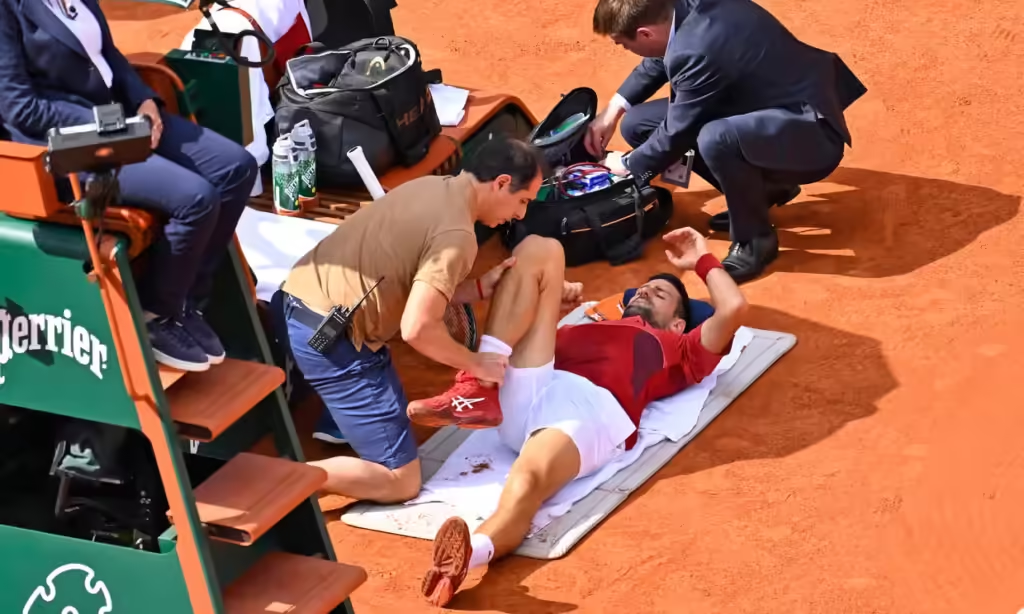
The reigning champion Novak Djokovic was forced to withdraw from the French Open due to a ruptured medial meniscus, which he suffered during his thrilling five-set victory against the 23rd-seeded Argentinean Francisco Cerúndolo on Monday.
Djokovic posted a message on social media that read, “I am really sad to announce that I have to withdraw from Roland Garros.
” “I gave it my all and played with all my heart in yesterday’s game, but sadly, my right knee’s medial meniscus tear forced my team and I to make a difficult decision after much thought and discussion.
“I wish the best of luck to the players competing this week and sincerely thank the incredible fans for all of the love and continued support.”
Djokovic had been leading by a set on Court Philippe-Chatrier when he slipped on the court and hurt his knee.
After receiving treatment, the 37‑year‑old was extremely critical of the state of the French Open’s courts; he believed the rain and poor weather had affected the courts, removing some of the top layer of clay and making it much more slippery.
In his conversation with the tournament supervisor, Wayne McKewen, Djokovic expressed his frustration at the courts not being swept more frequently.
“It seems like that some of the clay was removed, so there was very little, almost no clay on the court today,” he said. “
Because of the drier conditions and sun and warmer conditions, it affects the clay in such a way that, you know, it becomes very slippery.
So the injury that I had today with the knee happened exactly because of that, because I slipped, and I slide a lot. I mean, everyone slides on clay, but I slipped way too many times.”
Despite limping around the court and falling down 2-4 in the fourth set while trailing two sets to one, Djokovic launched another dramatic comeback to win and reach the quarter-finals. Afterwards, he said that the significant amount of painkillers he had taken had allowed him to play without pain in the final stages of the match but he said he would not learn more until he undertook scans.
“After the third set was done, I asked for more medications, and I got them,” Djokovic said. “That was the maximum dose that kicked in, as I heard now from [a] doctor after 30 to 45 minutes, which was just about the time – kind of end of the fourth – when things started to really improve for me.

I started to feel less limitations in my movement. Basically the whole fifth set was almost without any pain, which is great, you know. But then the effect of the medications will not last for too long, so I’ll see.”
With Djokovic’s withdrawal, Jannik Sinner will rise next week to the No 1 ranking for the first time in his career. Sinner will be the first Italian world No 1 in the history of the ATP rankings and the 22‑year‑old’s rise means there will already be more No 1s born in the 2000s (Carlos Alcaraz and Sinner) than in the 1990s (Daniil Medvedev).
The injury also means Djokovic is a major doubt for Wimbledon, where he is a seven-time champion and finished as a finalist last year, losing against Alcaraz.
This season continues to be one of the most difficult years of Djokovic’s career. He arrived in Paris struggling to find form and motivation and he has not won a title this year, which has happened only once at this stage in the year since he won his first title in 2006.
Despite the Serb’s considerable efforts in Paris, with nine hours spent on court in his past two matches after recovering from two sets to one down to win against Lorenzo Musetti, the 30th seed, at 3.07am then launching another dramatic comeback while injured to beat Cerúndolo, Djokovic now must work his way back from an injury with just over seven weeks until the Olympics begin.
While being confirmed as the next world No 1, Sinner continued his imperious form by outplaying Grigor Dimitrov, the 10th seed, 6-2, 6-4, 7-6 (3) to reach the French Open semi-finals for the first time. Since Djokovic had withdrawn during the match, Sinner did not learn about his forthcoming rise until his on-court interview. “I am very happy about this achievement,” he said.
“It’s a lot of work we put in daily. It’s a daily routine. Obviously happy to have this number. In two days there is a very important match for me, the semi‑finals, so I’m focused about that at the moment. But, yes, of course, very happy to have this number now.”
Having arrived in Paris with doubts about his hip injury, which had forced him to withdraw before his quarter‑final at the Madrid Open and the Italian Open, Sinner has continued to improve throughout the rounds and he has marked himself as one of the top title contenders. He is now 33-2 this year and, by following up his Australian Open title with a semi-final run in Paris, he remains unbeaten at the grand slam tournaments after 12 matches.
Sinner will rekindle his rivalry with Carlos Alcaraz in the semi-final after the third seed rolled past Stefanos Tsitsipas, the ninth seed, 6-3, 7-6 (3), 6-4 on Tuesday night. After breaking down the Greek’s vulnerable single-handed backhand once again and peppering him with drop shots throughout the night, Alcaraz’s record against Tsitsipas now stands at 6-0.
Alcaraz entered the tournament with his own physical issues after withdrawing from Rome with a forearm injury. Since arriving in Paris, though, the 21-year-old has gradually improved and he has struck the ball particularly freely since his third‑round match. Whoever survives this enormous semi-final on Friday afternoon will be heavily favoured to close out the tournament with their first French Open title.
Teams of lawyers from the rich and powerful trying to stop us publishing stories they don’t want you to see.
Lobby groups with opaque funding who are determined to undermine facts about the climate emergency and other established science.
Authoritarian states with no regard for the freedom of the press.
Bad actors spreading disinformation online to undermine democracy.
***
But we have something powerful on our side.
We’ve got you.
The Guardian is funded by readers like you in Nigeria and the only person who decides what we publish is our editor.
If you want to join us in our mission to share independent, global journalism to the world, we’d love to have you on side.
If you can, please support us on a monthly basis. It takes less than a minute to set up, and you can rest assured that you’re maki




